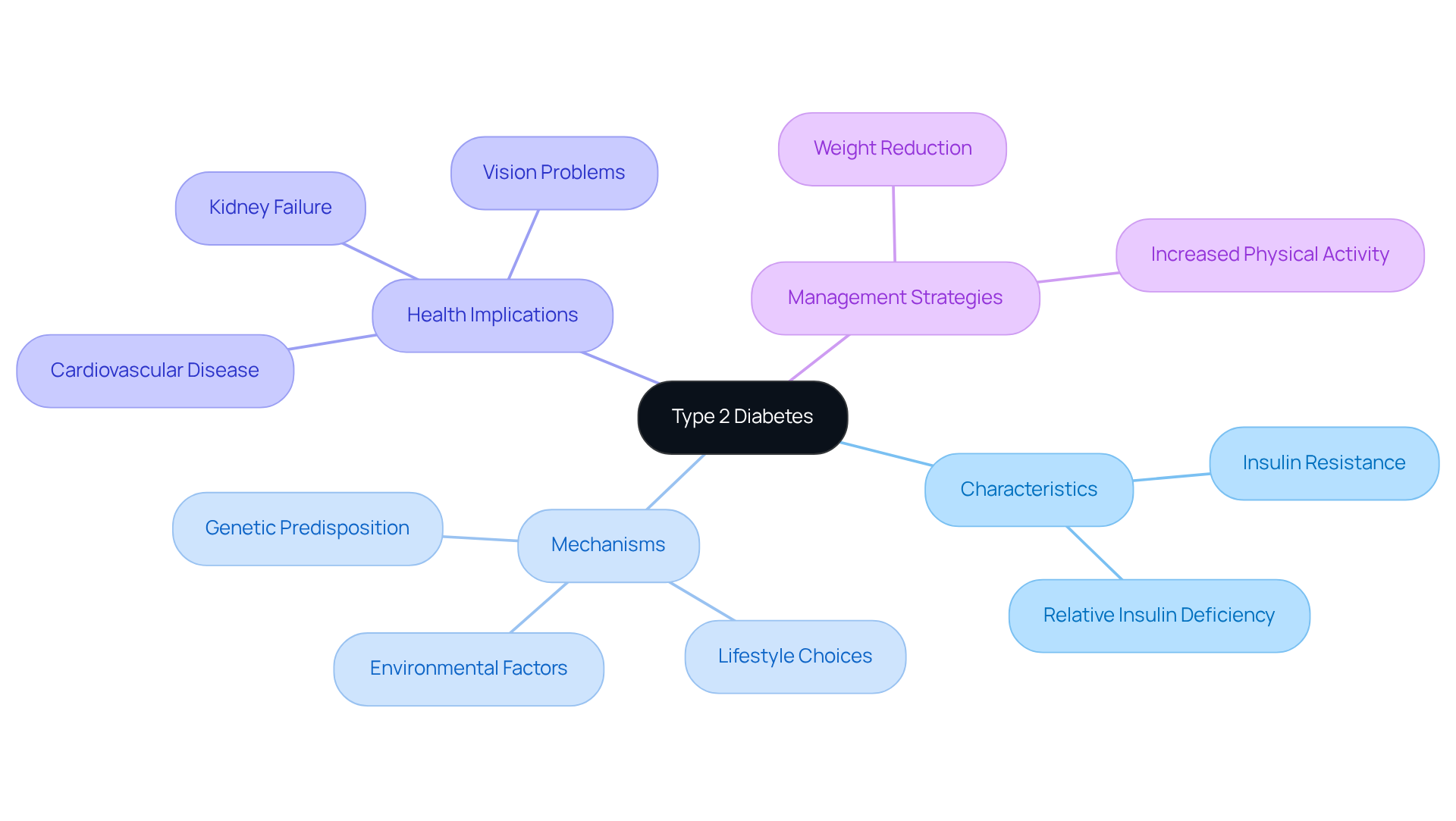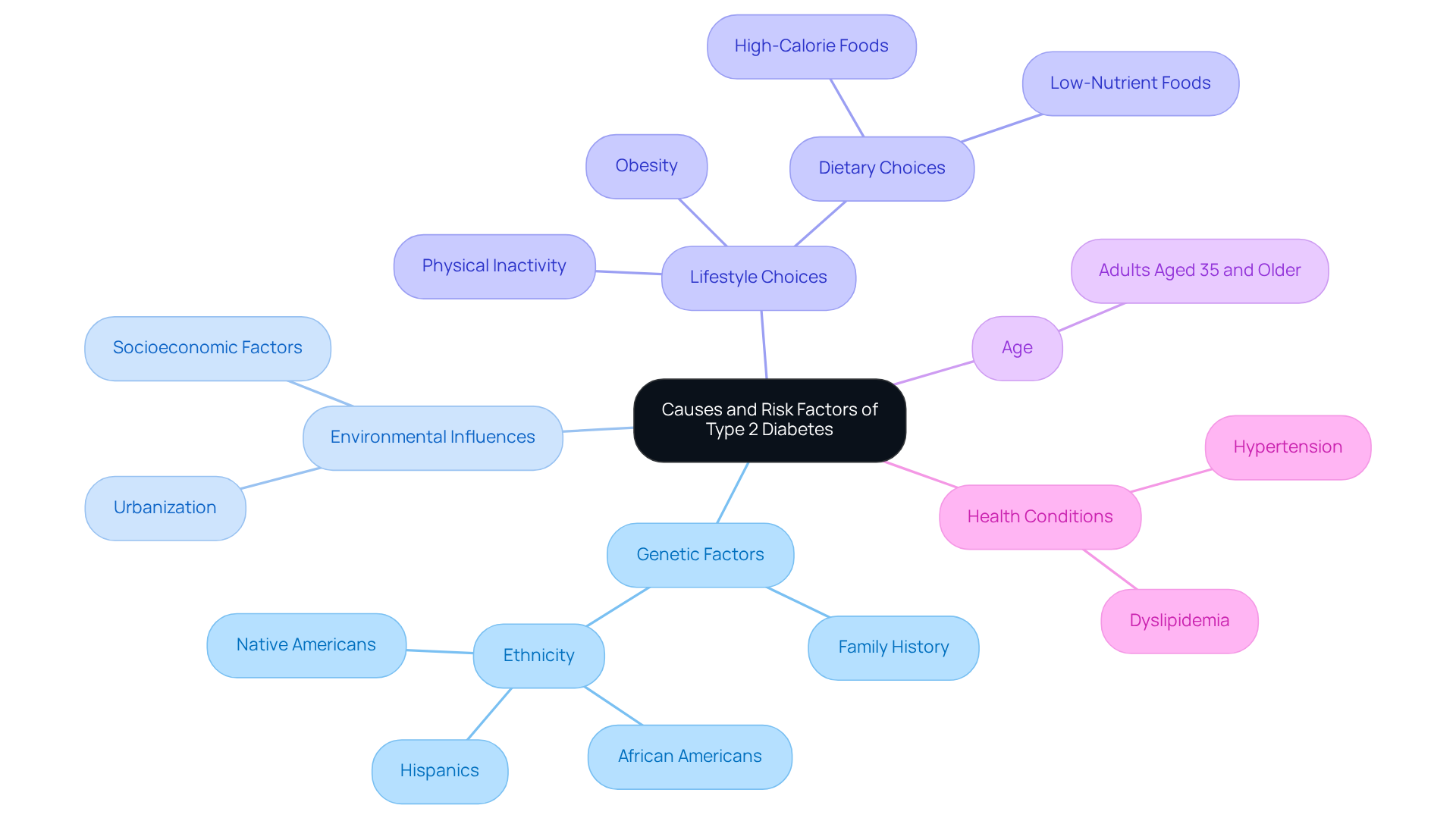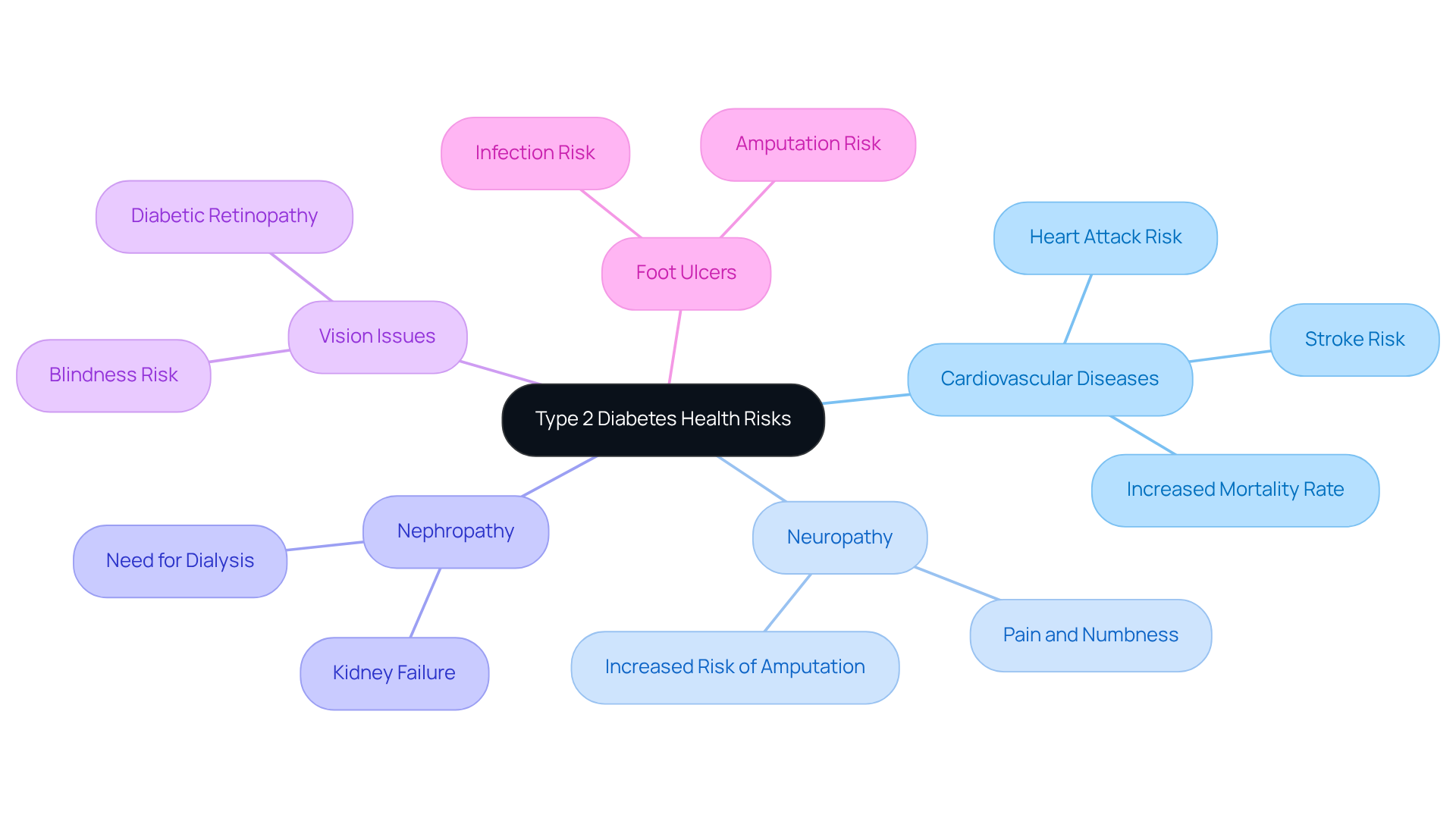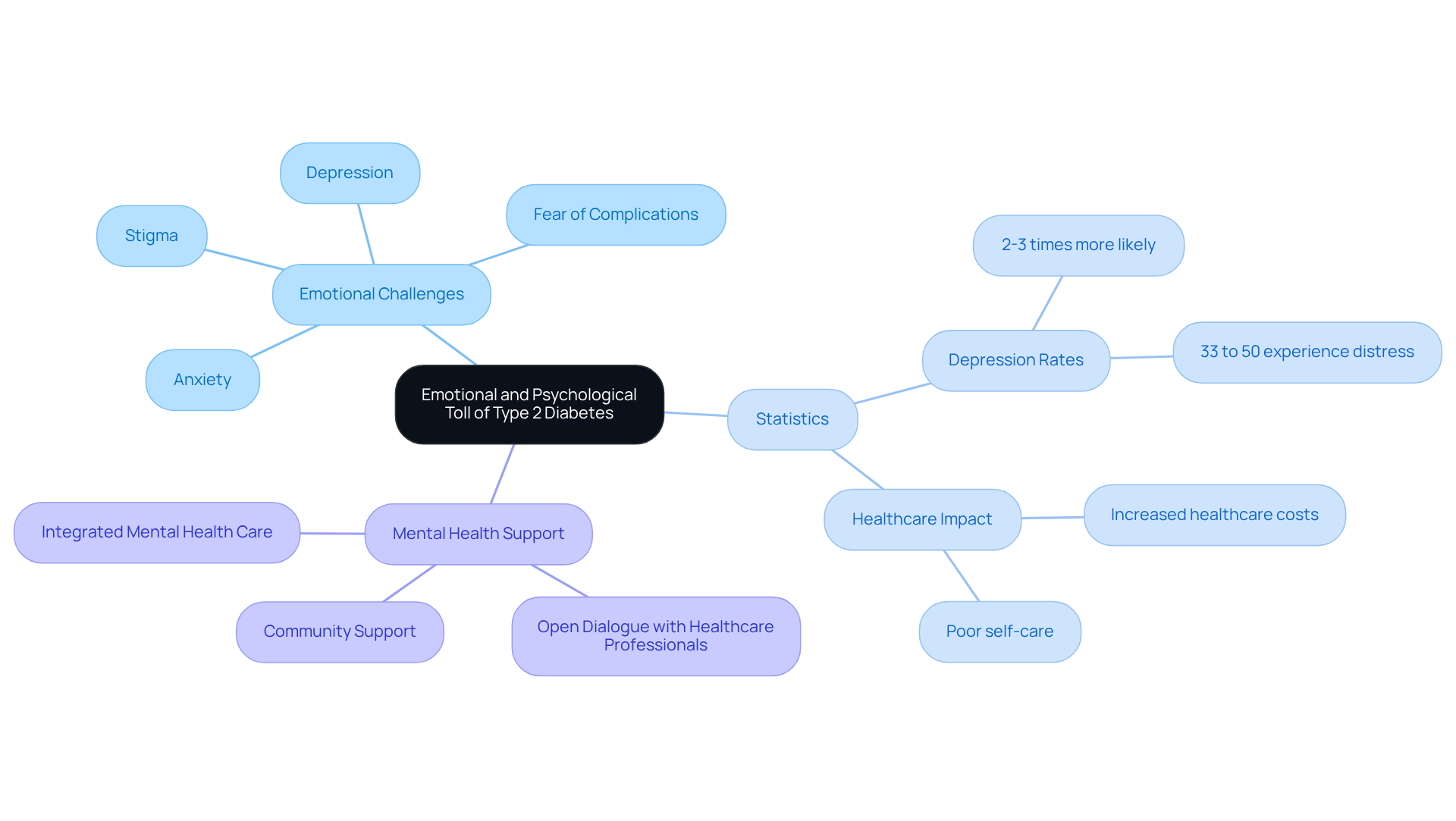Overview
Type 2 diabetes can feel overwhelming, especially when you consider its serious health risks and complications, such as:
- Cardiovascular disease
- Kidney failure
- Vision problems
These issues can significantly impact your quality of life, and it's understandable to feel concerned. The article highlights how chronic hyperglycemia, resulting from insulin resistance, leads to these complications. This emphasizes the importance of effective management strategies to help you navigate these challenges and improve your overall well-being.
You're not alone in this journey. Many individuals face similar concerns, and there are resources available to support you. It's crucial to seek out effective management strategies that not only address your health but also enhance your quality of life. By understanding the implications of Type 2 diabetes, you can take proactive steps toward better health.
Remember, we are here to support you every step of the way. Connecting with healthcare professionals can provide you with the guidance you need. Sharing your experiences with others who understand can also foster a sense of community and support. Together, we can work toward a healthier future.
Introduction
Type 2 diabetes is more than just a diagnosis; it represents a complex interplay of genetic, lifestyle, and environmental factors that can lead to serious health complications. It's understandable to feel overwhelmed by this condition, as it poses significant risks such as:
- Cardiovascular disease
- Kidney failure
- Emotional distress
However, amidst these challenges lies an opportunity for individuals to take proactive steps towards better health management. What strategies can you employ to mitigate the dangers associated with type 2 diabetes? How can you navigate the emotional landscape that often accompanies this condition?
You're not alone in this journey, and there are resources available to support you every step of the way.
Define Type 2 Diabetes and Its Mechanisms
This condition is a chronic metabolic disorder characterized by insulin resistance and relative insulin deficiency. It’s understandable to feel concerned about how this affects your body, particularly when you wonder if type 2 diabetes is bad. In this condition, the body's cells—especially in muscle, fat, and liver tissues—become less responsive to insulin, the hormone that helps regulate blood sugar levels. As a result, glucose can accumulate in the bloodstream, leading to hyperglycemia.
The underlying mechanisms of the second form of diabetes are complex, involving interactions among genetic predispositions, lifestyle choices, and environmental factors. Initially, the pancreas tries to compensate for insulin resistance by producing more insulin. However, over time, this compensatory response can diminish, leading to persistently elevated blood sugar levels. This raises the likelihood of serious health complications, including cardiovascular disease, kidney failure, and vision problems, demonstrating that is type 2 diabetes bad. Understanding these mechanisms is crucial for recognizing how is type 2 diabetes bad for your overall health. It also highlights the necessity for effective management strategies.
Recent studies emphasize that changes in lifestyle, such as weight reduction and increased physical activity, can significantly enhance insulin sensitivity. This can lower the likelihood of developing the second form of diabetes. You're not alone in this journey; many individuals who adopt healthier habits experience substantial improvements in their blood sugar control. This demonstrates the importance of proactive management, especially considering that is type 2 diabetes bad for mitigating the effects of the disease.
If you're feeling overwhelmed, remember that there are resources and support available to help you navigate this journey. Taking small steps can lead to meaningful changes in your health. We are here to support you every step of the way.

Examine the Causes and Risk Factors of Type 2 Diabetes
The onset of Type 2 diabetes is influenced by a complex interaction of genetic, environmental, and lifestyle factors. It's important to understand that obesity is a significant contributor, with over 90% of individuals diagnosed with this condition categorized as having Type 2 diabetes, often linked to excessive body weight. Physical inactivity and poor dietary choices, characterized by high-calorie and low-nutrient foods, can further increase the likelihood of developing insulin resistance. Additionally, age plays a crucial role, as adults aged 35 and older become increasingly susceptible to this condition.
Family history is another vital aspect to consider. If you have relatives with diabetes, your chances of developing the condition may be higher. Certain ethnic groups, including African Americans, Hispanics, and Native Americans, also show a greater predisposition to Type 2 diabetes. Moreover, conditions like hypertension and dyslipidemia can heighten these risks, making it essential to be aware of your health status.
Addressing these contributing factors through lifestyle changes is crucial. Engaging in regular physical activity—aiming for at least 150 minutes of moderate exercise each week—can significantly reduce the risk of developing blood sugar issues. Furthermore, adopting a balanced diet rich in whole foods while minimizing sugar and saturated fats can help maintain a healthy weight and enhance overall well-being. By understanding these causes and contributing factors, you can take proactive steps to prevent or delay the onset of this condition, as is Type 2 diabetes bad, ultimately improving your quality of life. Remember, you're not alone in this journey; we are here to support you every step of the way.

Identify the Health Risks and Complications Linked to Type 2 Diabetes
The question of whether is type 2 diabetes bad arises from its link to a range of serious health risks and complications that can profoundly affect your quality of life. It's understandable to feel concerned about chronic hyperglycemia, as it raises the question of whether is type 2 diabetes bad, and can lead to cardiovascular diseases, including heart attacks and strokes. High blood sugar levels are an indication that is type 2 diabetes bad, as they damage blood vessels over time, making those with the condition roughly twice as likely to encounter these cardiovascular events compared to those without it. Additionally, complications such as neuropathy can result in pain and numbness in your extremities, while nephropathy may progress to kidney failure, raising the question of whether is type 2 diabetes bad, necessitating dialysis or transplantation.
Vision issues are also common among individuals with high blood sugar, which raises the question of whether is type 2 diabetes bad, as diabetic retinopathy is a leading cause of blindness. Studies indicate that around 30% of individuals with type 2 diabetes bad also suffer from cardiovascular disease, underscoring how interconnected these conditions can be. Poorly managed blood sugar levels can lead to foot ulcers and infections, which raises concerns about whether is type 2 diabetes bad, as these issues may escalate to amputations if not addressed promptly. It's important to be aware of these risks, particularly because is type 2 diabetes bad for your health, so you can take proactive steps toward your well-being.
The economic burden of these complications raises the question of is type 2 diabetes bad, significantly impacting healthcare systems and the lives of individuals like you. Regular monitoring and effective management strategies, including lifestyle changes and medication adherence, are crucial in preventing or mitigating the serious health issues that arise when is type 2 diabetes bad. Remember, you're not alone in this journey. As healthcare experts stress, effective management of blood sugar issues and related risk factors is vital for lowering the likelihood of heart attack or stroke, highlighting the concern that is type 2 diabetes bad. By taking these steps, you can enhance your quality of life and feel more in control of your health, especially when considering whether is type 2 diabetes bad.

Explore the Emotional and Psychological Toll of Type 2 Diabetes
Living with Type 2 Diabetes is type 2 diabetes bad and can be an emotionally challenging journey. It's understandable to feel overwhelmed by the anxiety, depression, and distress that often accompany the demands of managing your health. The fear of complications, the need for lifestyle changes, and the stigma surrounding whether is type 2 diabetes bad can weigh heavily on your mind and spirit. Research shows that individuals with diabetes are two to three times more likely to experience depression than those without the condition. This emotional burden can lead to burnout, causing you to question if is type 2 diabetes bad for your overall well-being.
For many, the statistics are startling: studies indicate that between 33% and 50% of individuals with diabetes, which raises the question of whether is type 2 diabetes bad, experience distress related to their health within any 18-month period. Feelings of discouragement and frustration are common, and it's crucial to address these psychological aspects for comprehensive care, particularly when exploring the question of is type 2 diabetes bad. Recognizing whether is type 2 diabetes bad is a vital step in effective disease management, as mental health plays a significant role.
Experts stress the importance of integrating mental health support into chronic illness management, particularly when considering if type 2 diabetes is bad for overall health. Open dialogue between you and your healthcare professionals can foster a supportive atmosphere, making it easier to navigate your diabetes journey. Remember, you're not alone in this journey. By acknowledging and addressing these emotional challenges, you can improve your overall well-being and find the support you need. We are here to support you every step of the way.

Conclusion
Type 2 diabetes is a multifaceted condition that poses significant risks to overall health and well-being. It's understandable to feel overwhelmed by its implications, which extend beyond mere glucose management, affecting various bodily systems and leading to serious complications. Understanding the intricacies of this disorder is vital for recognizing its potential dangers and the importance of proactive management.
Throughout this article, we have highlighted key points, including the mechanisms of insulin resistance, the role of lifestyle factors in the onset of the disease, and the severe health risks associated with chronic hyperglycemia. Additionally, we have emphasized the emotional and psychological toll of living with type 2 diabetes, showcasing how mental health is intertwined with physical health in the context of this condition. Acknowledging these elements is crucial for anyone seeking to navigate their diabetes journey effectively.
Ultimately, the message is clear: type 2 diabetes is a serious condition that requires comprehensive management and support. By adopting healthier lifestyle choices, staying informed about the risks, and addressing emotional challenges, you can significantly improve your quality of life. Remember, you're not alone in this journey; it's essential to engage with healthcare professionals and utilize available resources to foster a supportive environment that empowers you. Taking these steps not only mitigates the risks associated with type 2 diabetes but also enhances your overall well-being and resilience in the face of this chronic illness.
Frequently Asked Questions
What is type 2 diabetes?
Type 2 diabetes is a chronic metabolic disorder characterized by insulin resistance and relative insulin deficiency, leading to elevated blood sugar levels.
How does type 2 diabetes affect the body?
In type 2 diabetes, the body's cells, particularly in muscle, fat, and liver tissues, become less responsive to insulin, resulting in glucose accumulation in the bloodstream and causing hyperglycemia.
What are the underlying mechanisms of type 2 diabetes?
The mechanisms involve a combination of genetic predispositions, lifestyle choices, and environmental factors. Initially, the pancreas compensates for insulin resistance by producing more insulin, but this response may diminish over time.
What health complications are associated with type 2 diabetes?
Serious health complications can include cardiovascular disease, kidney failure, and vision problems, highlighting the negative impact of type 2 diabetes on overall health.
Can lifestyle changes impact type 2 diabetes?
Yes, lifestyle changes such as weight reduction and increased physical activity can significantly enhance insulin sensitivity and lower the likelihood of developing type 2 diabetes.
How can individuals manage type 2 diabetes effectively?
Proactive management through healthier habits can lead to substantial improvements in blood sugar control, making it essential for individuals to adopt effective management strategies.
What resources are available for individuals with type 2 diabetes?
There are various resources and support systems available to help individuals navigate their journey with type 2 diabetes, providing assistance in making meaningful health changes.



